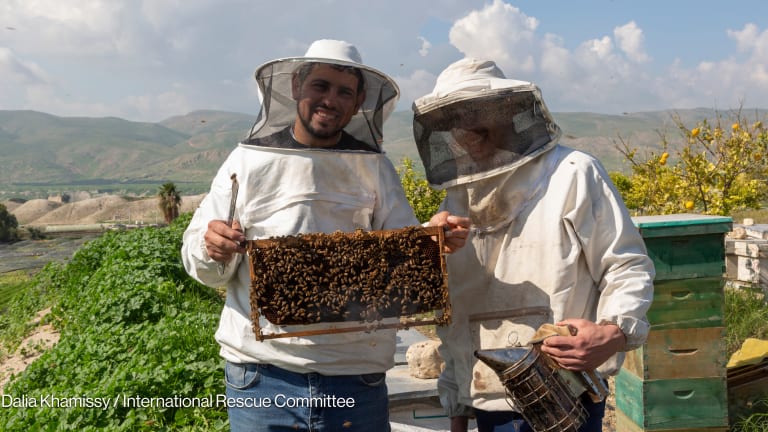
Vaccines are now available globally to help protect people from COVID-19, yet many people with disabilities — who are at higher risk of adverse COVID-19 outcomes — have not been prioritized around the world.
This lack of equity overlooks the various social factors, living arrangements, such as requiring in-person care or living in congregate settings, and higher rates of comorbidities that have contributed to disproportionate adverse outcomes for people with disabilities, including physical, intellectual, and sensory impairments.
For instance, 60% of deaths in the United Kingdom were among people with disabilities — a mortality rate roughly twice the general population.
Sign up for Devex CheckUp
The must-read weekly newsletter for exclusive global health news and insider insights.
While 15% of the world’s population experiences disability in some form, few countries systematically collect disability-disaggregated data to understand and quantify the adverse impacts of COVID-19. This lack of data has limited the success of disabled advocates and allies’ calls to prioritize disabled people and their caregivers around the world.
Some countries have prioritized the vaccine for persons with disabilities, but distribution programs have had confusing eligibility and limited accessibility. For example, in Australia, people with disabilities living in residential care were prioritized, but many have yet to be vaccinated.
In India, activists have lobbied for home vaccination and since Tamil Nadu developed a program, Delhi and other states have now followed their good practice. However, as countries expand their vaccination campaigns for the general population, they must build on these good practices and consider how they will make their vaccine programs accessible to all disabled people.
First, vaccination locations must be accessible, in accordance with the local laws. An accessible facility includes everything from the physical space to the facility’s environment. For instance, places with steps, loud noises, lots of people, or bright lights will be inaccessible for many people with disabilities.
If the focus could shift to accessible locations, close to the community or their doorstep, more people with disabilities could receive their vaccine.
Taking the vaccine closer to communities and individuals reduces barriers, which will facilitate greater access for at-risk people.
—Second, within countries and regions, distribution and administration sites should be at easy-to-reach locations. These sites need to be universally accessible, have long hours and easy booking systems, so that scheduling, location, and accessibility do not limit individuals’ access to the vaccine.
In particular, these sites should be located near accessible transport and parking to ensure that the entire vaccination experience — from home to vaccine facility and back — are accessible. Some countries have even provided accessible transport for people with disabilities to get their vaccine, which has also enhanced the accessibility of vaccination sites, and others have home vaccination.
Third, vaccine drives should deliberately target people with disabilities, along with the families, caregivers, therapists, teachers, and medical staff that support them.
For instance, Israel brought vaccines to a local, accessible community center to vaccinate people with disabilities and their caregivers. Similarly, in Chile, the ministry of health arranged for mobile teams to vaccinate people unable to travel to a local immunization facility.
This leave no-one behind approach is the exact spirit we need in vaccinating the world against COVID-19. Taking the vaccine closer to communities and individuals reduces barriers, which will facilitate greater access for at-risk people.
Fourth, countries must make COVID-19 resources, including information, advisories, and public announcements accessible for everyone. The Centers for Disease Control and Prevention has resources about COVID-19 that are easy-to-read and in multiple formats, such as for large font, videos with captions, and sign language interpretation, and braille.
Following translation, these accessible formats, including sign language and captions will help people access critical information about the COVID-19 vaccine, and where to get it. These efforts should be coupled with extensive outreach and communication efforts to improve vaccine confidence and work with local communities to reach all individuals.
Fifth, staff training is key to shifting attitudes toward disability. It is important that staff who vaccinate people with disabilities should be educated in advance, to the best extent possible. This should include training on communication and accommodations to ensure the experience is inclusive and accessible to disabled people.
In the U.K. and Canada, accessible sites that have staff trained in treating people with disabilities have been set up. These facilities have been transformative in ensuring an inclusive and accessible environment for people with disabilities to get their vaccine.
These strategies can enhance the accessibility of COVID-19 vaccination for people with disabilities.
In our countries, India and Canada, persons with disabilities remain largely unreached, despite the urgency to protect at-risk individuals. Without ample vaccine supply, prioritization, concerted efforts for accessibility, inclusion, or outreach for people with disabilities, there will continue to be challenges with access and uptake, leaving this population at-risk and unvaccinated.










